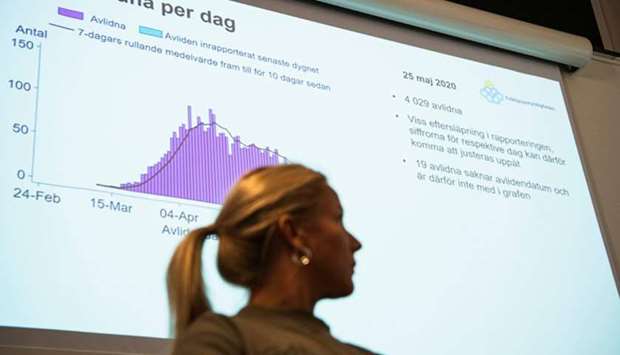Sweden, which has gained international attention for its softer approach to the coronavirus than many of its European neighbours, said yesterday that its number of deaths passed the 4,000 mark.
The Public Health Agency said it had recorded 4,029 deaths and 33,843 confirmed cases of the novel coronavirus in the country of some 10.3mn inhabitants, with 90% of the deceased over the age of 70.
Sweden’s death toll has far surpassed the tolls in neighbouring Nordic countries, which have all imposed more restrictive containment measures.
According to website Worldometer, Sweden’s virus death rate of 399 per million inhabitants is far higher than Norway’s death rate of 43 per million, Denmark’s rate of 97, or Finland’s rate of 56.
However it is still lower than France’s 435, the UK’s and Italy’s 542, and Spain’s 615.
Critics have accused Swedish authorities of gambling with the lives of citizens by not imposing strict stay-at-home measures.
But the Public Health Agency has insisted their more relaxed approach is sustainable in the long-term and has rejected drastic short-term measures as too ineffective to justify their impact on society.
The Scandinavian country has kept schools open for children under the age of 16, along with cafes, bars, restaurants and businesses, while urging people to respect social distancing and hygiene guidelines.
State epidemiologist Anders Tegnell of the Public Health Agency has repeatedly insisted that stricter measures would not have saved more lives.
Three-quarters of Swedes who have died have been either in nursing homes or receiving at-home care.
Tegnell noted that a ban on visits to nursing homes was introduced in mid-March, but said elderly residents needed regular contact with their carers – who were believed to have spread the virus around nursing homes.
“I’m really not sure that we could have done so much more,” he said in a weekend interview with Swedish Radio, acknowledging nonetheless that the country had ended up in a “terrible situation that highlights the weaknesses of our elderly care”.
He said care homes had initially failed to respect basic hygiene rules that could have curbed the spread of the disease, but said the situation had since improved.

A journalist is seen in front of a screen as the Swedish Public Health Agency releases the new total number of people who died due to the coronavirus, during a press conference yesterday in Solna, near Stockholm.
